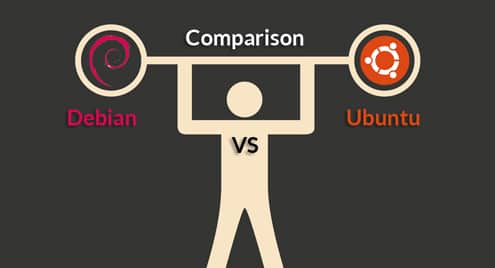In brief, the history shows Debian used to lead the market after Red Hat becoming the most chosen distribution for advanced users throwing Gentoo or Slackware almost out of the market. Yet Debian had an issue for users who wanted to keep a stable system with the last software.
Debian has 3 classification for its release cycle going from unstable to testing and stable, being each the following:
Debian stable releases: the Debian stable distribution includes only successfully tested software, it is the production release, ready to be installed on any server. Debian stable releases are insanely stable and contain well tested, but out of date packages.
Examples of stable releases would be the current Debian 10 Buster, Debian 9 Stretch, Debian 8 Jessie, etc.
Debian unstable releases: the unstable Debian release, also known as sid, is the distribution under development to become testing to later become stable. This release is for developers, contributors and users who must keep the last up to date software, of course this distribution isn’t reliable for servers or professional tasks and are likely to crash.
Debian testing releases: the Debian testing release is the version waiting to become stable after passing the period as unstable, the advantage is, despite it wasn’t confirmed as stable it was sent for approval by developers and testers and contains more up to date software than the stable release and testing release, that’s why Ubuntu is based on Debian unstable.
While lately Debian is releasing stable distributions every year, and sometimes twice a year like in 2019 with Stretch and Buster, formerly Debian users waited for years to get new stable releases, for example Debian 3 Woody was released in 2002, then in 2005 Debian sarge 3.1 was released, Debian etch came 5 years later in 2010 and from Lenny Debian community started to release a stable version each 2 years or shorter intervals.
In early 2000 Ubuntu was released with an attractive proposal to both to the biggest Linux users community (Debian users) and to new users killing Mandriva (A Mandrake and Conectiva fusion) and every distribution targeting new Linux users.
The proposal was a distribution based on Debian unstable, containing updated software with improved stability without reaching Debian stable guarantee but providing latest software and updated Debian packages with added Ubuntu modifications.
While Debian up to date releases took years to be released Ubuntu provided users a flow of updates within periods of half a year. At the beginning Debian kept monopolized by advanced users and Ubuntu welcomed the current generation of LInux users or most of them, today both releases may be used by any user.
In conclusion the differences between Debian and Ubuntu may be summarized as: Debian is more stable than Ubuntu, because Ubuntu is based on the unstable release of Debian. Ubuntu also uses proprietary software while Debian uses only free software. Ubuntu releases have longer support and trends to be a lot more user friendly than Debian by taking advantage of proprietary software which is indifferent for new users who don’t care about the free software philosophy, on the other hand Ubuntu won’t be used by users who care about it.
The inclusion of non-free packages allows Ubuntu to grant better hardware compatibility, yet Debian is available for many architectures while Ubuntu focuses on few such as x64 and x86.
Despite it is a matter of personal taste it can be said between both of them Debian is the best choice for Servers while Ubuntu may be a good option for Desktops, of course, you can use great Ubuntu distributions for servers too.To end this comparison lets remind Debian supports multiple desktop environments while Ubuntu comes with GNome only, there are available Ubuntu distributions with different X Windows Managers.
You can get Debian from https://www.debian.org/distrib/ and Ubuntu from https://ubuntu.com/download, there you can get available distributions for all architectures from direct sources and torrent links.
I hope you found this brief comparison on Debian vs Ubuntu useful, thank you for reading it.


